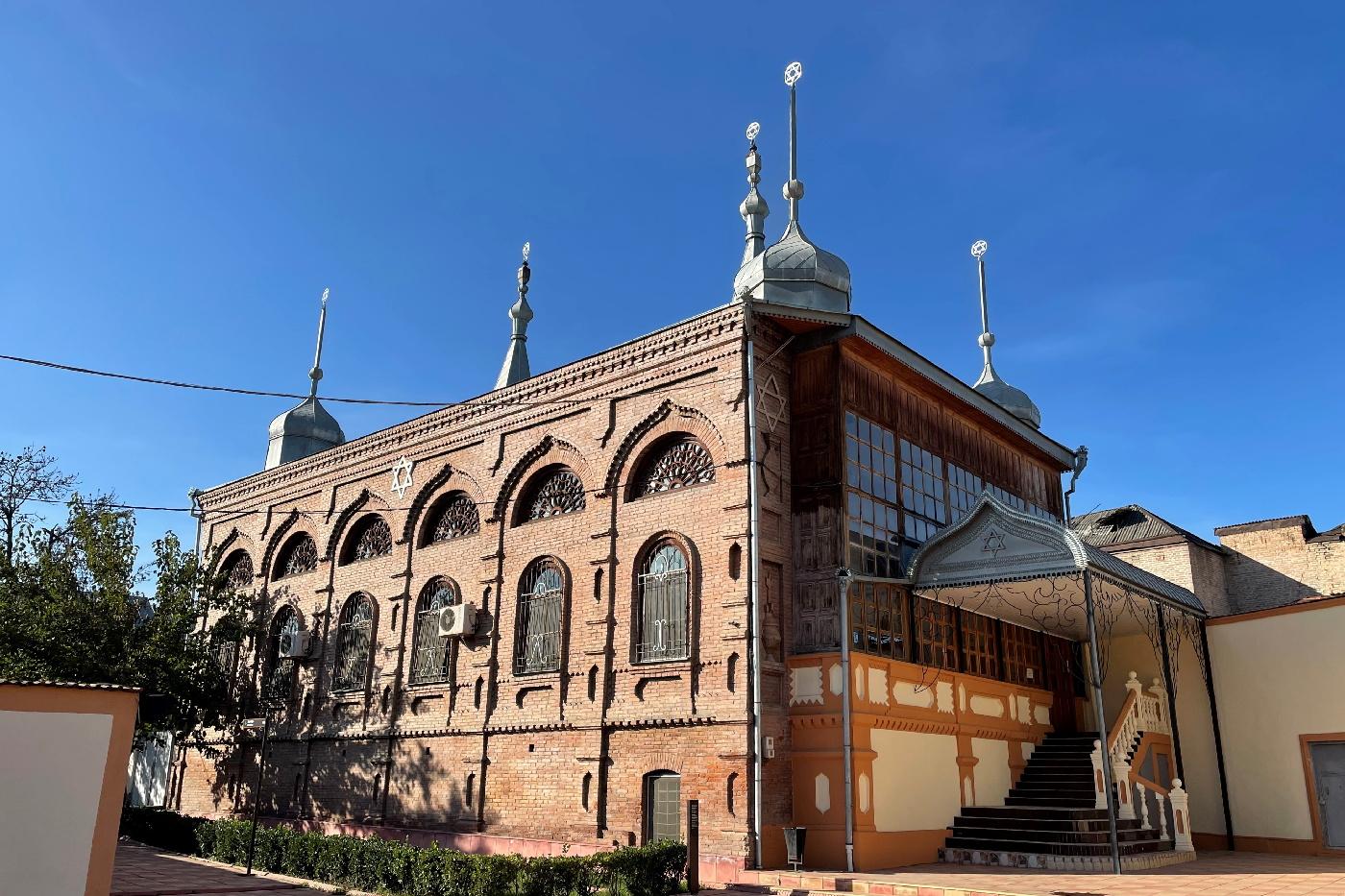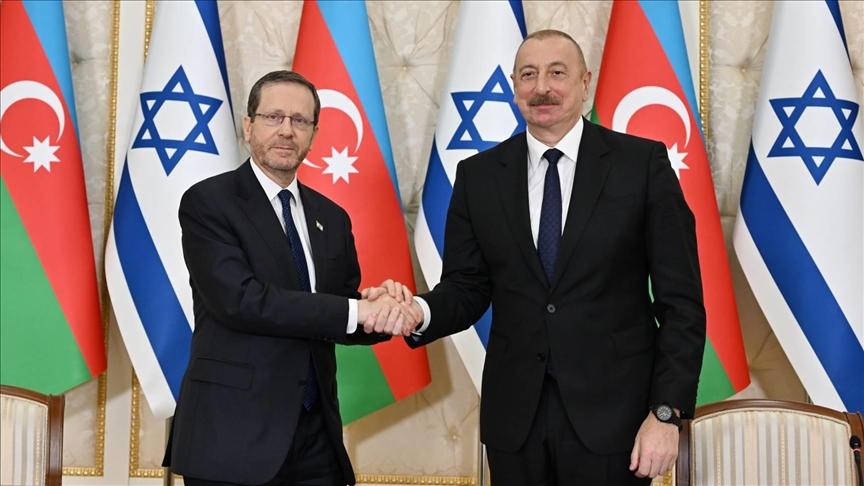Unique political phenomenon: Azerbaijan-Israel partnership Analysis by Matija Šerić
The Eurasia Review has featured an article by Matija Šerić, Croatian geopolitical analyst and journalist. In his analysis, the author refutes the myth describing the Azerbaijan-Israel friendship as "oil for weapons", claiming that it's rather a unique political phenomenon.
Caliber.Az reprints the article.
In the last three decades, relations between the Republic of Azerbaijan and the State of Israel have been developing more and more intensively. Relations have reached the level of strategic partnership. Some analysts describe the alliance between Baku and Tel Aviv with the simple phrase “oil for weapons”.
However, although such a view is correct, it is deficient and does not describe the full depth of Azerbaijani-Israeli relations in the historical, cultural and political sense. Reducing the unique partnership of a Muslim and Jewish state to just weapons and oil is sacrilegious because it is a unique political phenomenon that shows that Muslim states can also cultivate friendship with Israel.
Historical context
Azeri-Jewish relations have a long history that goes back to the Babylonian exile of the Jewish people 2700 years ago. Unlike other Muslim-majority countries where they were exposed to persecution, Jews in Azerbaijan have lived in peace throughout history. The country of Azerbaijan is historically known for its multi-ethnic spirit even though it is predominantly Muslim and Shiite. The history of peaceful coexistence of Muslims and Jews can be seen most vividly in the example of the Red Village, an ancient Jewish settlement in the Quba province of Azerbaijan. It was created by the Azerbaijani ruler Fatali Khan in the 18th century to protect Jews fleeing Persia.

Although many Azerbaijani Jews migrated to Israel after the collapse of the USSR, they did not forget their roots. This was clearly seen during the Second Nagorno-Karabakh War in 2020, when thousands of Azerbaijani Jews took to the streets of Jerusalem and Tel Aviv waving Azerbaijani flags. It is a unique example of Jews giving support to a country they migrated from other than the US. When that country is Muslim, then it is an even more unique case. While Jews who left Syria or Iraq are nostalgic for their old homeland but have no intention of visiting it, Azerbaijani Jews return to ancient homeland as tourists during annual vacation.
It is no exaggeration to say that Israelis of Azerbaijani origin have two homelands: Israel and Azerbaijan. Unlike the Arab capitals where the Jewish historical and cultural heritage was mostly destroyed, the Azeri capital Baku is a cosmopolitan city where thousands of Jews live and practice their faith freely in two state-funded synagogues. Today, about 30,000 Jews live in Azerbaijan and they are the last remaining Jews in the Caucasus. Azeris respect the long struggle to maintain an independent Jewish state. Baku has long been the centre of the Zionist movement, and many Azerbaijani Jews were at the forefront of the nationalist movement to create an independent Azeri state from 1918 onwards. It can be said that the secular character of Azerbaijan (republicanism, pluralism) created a environment for Jews.
Establishment of modern relations
The two countries established diplomatic relations in April 1992. Israel opened its embassy in Baku as early as August 1993. On his return from his first visit to Baku in 1993, Benjamin Netanyahu stated that “the Israeli-Azerbaijani relationship gives us hope that all the children of Abraham can to find peace and friendship… that rises above the Caspian Sea and sets over the Mediterranean.”
Azerbaijan deliberately delayed the opening of its embassy in Tel Aviv until March 2023, because it feared retaliation from neighboring Iran. In accordance with its traditional Peripheral Doctrine (maintaining good relations with the peripheral non-Arab states of the Middle East in order to alleviate the Arab blockade), Israel hastened to form partnerships with the Muslim countries of Central Asia after the collapse of the USSR.
On the other hand, Israel needed the newly created Azerbaijan, which was an unstable country whose vast territory was occupied by Armenia in the First Nagorno-Karabakh War 1989-94. Azerbaijani-Israeli relations were often described as “discreet strategic relations”, which indeed they were. Relations were very developed (especially in the military and energy fields), but not much was said or written about it in the media in order not to irritate the Islamic world. On one occasion, Azerbaijani President Ilham Aliyev said that the relations between the two countries are like an iceberg and that “nine-tenths of relations are under the surface”. Azerbaijan had a potent economy that was about to be reoriented from a planned to a socialist economy, and Israeli companies wanted access. The Israeli company Bezeq bought a large share in the Azerbaijani telecom from the Azerbaijani government and thus in 1994 the joint company Bakcell was created, which became the strongest Azerbaijani telecom operator. Such moves helped liberalize the Azerbaijani economy.

Israel lobbied for Azerbaijan through Israel lobby organizations in the US such as the American Jewish Committee (AJC). The Israeli lobby waged a battle against the Armenian lobby in the US, which was also very strong, and the goal was to control the US Congress. Armenian lobbyists wanted to prevent Congress from approving the sending of US military aid to Azerbaijan, while the Israeli lobby wanted the opposite. In 1992, Armenians won when Congress passed a law that banned aid to Azerbaijan, but thanks to the efforts of the governments of Azerbaijan and Israel, the George W. Bush administration repealed the law. This decision paved the way not only for strong Israeli-Azerbaijani relations but also for strong American Jewish support for Azerbaijan.
BTC pipeline
An extremely important event for the development of Israeli-Azerbaijani relations was the opening of the BTC oil pipeline (Baku – Tbilisi – Ceyhan) in 2006, which gave Israel a quality alternative for supplying oil through the Arab states. General trade exchange was expanded. Azerbaijan became Israel’s second trading partner. In 2009, the trade exchange reached 180 million dollars, and several Israeli companies started investing in Azeri agriculture, which is the second most important sector of the national economy after services.
The rise of cooperation during the 2010s
During the 2010s, trade between the two countries recorded a further rise. Azerbaijan has become one of Israel’s largest suppliers of gas – almost 30% of Israel’s gas imports by 2011 came from Azerbaijan. Azeri oil and gas exports rose from $800 million in 2011 to nearly $1.8 billion in 2014 as the state-owned Azeri Oil Company (SOCAR) began exploring Israeli oil fields. This was followed by increased Israeli military support. From 2010 to 2011, Azerbaijan’s military spending nearly doubled from $1.59 billion to $3.1 billion, largely thanks to Israeli arms shipments and such as the 2011 shipment of a large drone package.
Tehran was an enemy of both Tel Aviv and Baku. Israel saw an interest in forging a strong alliance with Azerbaijan to curb Iran’s influence and power in the region. Secular Azerbaijan feared the Islamist influence of the theocratic Islamic Republic of Iran and Islamist groups supported by Tehran. On the other hand, Iran was also afraid of Azerbaijan, because 18 million Iranians are ethnically Azeri. At the same time, Azerbaijan had to face an increasingly hostile Armenia supported by Iran and Russia. Thus, two axis were gradually created in the 2010s: Baku-Tel Aviv and Yerevan-Tehran.
During the Nagorno-Karabakh conflict in 2016, Israeli Defense Minister Avigdor Lieberman supported Azerbaijan’s position in the conflict, calling it “absolutely justified” and blaming Armenia for the conflict. In December 2016, Prime Minister Netanyahu made an official visit to Baku. During the visit, he pointed out that “Israel and Azerbaijan enjoy excellent relations and cordial friendship”. In March 2017, the Israeli envoy to Azerbaijan made several regional tours to deepen economic cooperation in the spheres of economy, agriculture and tourism. The two countries abolished double taxation in April of that year. In January 2019, Azerbaijan purchased Israeli SkyStriker kamikaze drones, becoming the first foreign buyer of these weapons.
Crucial 2020
The year 2020 is a winning year for Israeli foreign policy. In the Second Nagorno-Karabakh War, Azerbaijan won a major victory over Armenian forces largely thanks to Israeli weapons (drones and missile interceptor systems) and other assistance (a digital map of the province) which drastically strengthened its position in the region.
At the same time, The Abrahamic Accords were signed – normalization of Israel’s relations with the UAE, Bahrain, Sudan and Morocco. Both events strengthened Israel’s position in the Middle East and the Caucasus and weakened Shiite Iran, which changed the balance of power to the satisfaction of Israeli policymakers. However, the price was the loss of Armenia, which definitely turned to cooperation with Iran, as confirmed by multiple gas agreements. It proved that the Israelis cannot sit on two chairs and support Armenia and Azerbaijan.

Open cooperation
After the Azerbaijanis won a great victory over the Armenians in 2020, they could show their cooperation with Israel more openly because they achieved the stability of the state. In February 2023, Israeli Defense Minister Yoav Gallant met with President Aliyev on the sidelines of the Munich Security Conference, where the Azerbaijani leader praised the progress made by the two partners in various areas of cooperation, especially in the defense and military-technical spheres.
In March, the Azerbaijani embassy was opened in Tel Aviv. During the opening of the embassy, Israel’s foreign minister, Eli Cohen, said that his government with Azerbaijan “forms a united front against Iran”. Gallant described his visit to Baku in July as “part of raising our relations to new levels”. He reaffirmed the partnership in a meeting with Azeri Defense Minister Zakir Hasanov, emphasizing “the positive history of the Jewish and Azerbaijani people along with common interests.”
On September 19, 2023, Azerbaijan launched a 24-hour military operation in the Nagorno-Karabakh region, bringing the Armenian enclave back under its control and ending the thirty-year conflict there. And again, Israeli weapons helped the Azeris to achieve the final victory.
The Iranian threat
In October, Azerbaijani security forces arrested an Afghan national with ties to Iran, who was planning an attack on the Israeli embassy in Baku.
On January 27, 2023, a gunman stormed the Azerbaijani embassy in Tehran, killing a security guard and wounding two others, resulting in a temporary severance of relations between Azerbaijan and Iran. Iranian authorities have repeatedly attacked Baku’s secret deal with the “Zionist regime” while keeping military forces on standby on its northern border.
Impressive trade cooperation
The trade links are impressive. In order to make friends with Muslim countries in the wider region, Israel supplies Azerbaijan with the most modern weapons and valuable intelligence information. Thanks to the cooperation with the Israelis, the Azerbaijani armed forces have advanced to the level of NATO standards, which is an extraordinary success for the Caucasian country.
From 2016 to 2021, Azerbaijan imported 69% of its weapons from Israel. From 2020 to 2022, Israeli arms shipments totaled $22 million. Azerbaijan supplies Israel with huge amounts of Caspian oil. Oil from Azerbaijan accounts for almost 40% of the oil that Israel imports. Thus, Israel ceased to be dependent on Arab oil. Israel’s state-owned aerospace company (IAI) has announced that it will sell Baku two satellites worth $120 million.
During the Israeli Bennett-Lapid government in the second half of 2022, the Azerbaijani-Israeli partnership was raised to the highest possible strategic level. Lapid called Azerbaijan an important partner of Israel. In October, the Azerbaijani government announced the establishment of the Jewish Cultural Center, which it finances. During 2022, Israel exported goods worth 159 million USD to Azerbaijan. Azerbaijani exports to Israel amounted to 1.68 billion USD. Israeli companies are investing in Azeri agriculture and cyber security and intend to invest about 3 billion USD in the reconstruction of Nagorno-Karabakh. The Azeri SOCAR oil company is exploring Israel’s Leviathan offshore oil field in the Mediterranean Sea.
Conclusion
The unique partnership between Azerbaijan and the Jewish state spans various spheres, including oil trade, military cooperation, investment and political support. Relations have become strategically crucial, especially in the context of dealing with Iranian influence in the region. It is an alliance against Iran, but two pro-Western states that often make moves that have nothing to do with Western values. In any case, the Azerbaijani-Israeli alliance is important in the wider context of geopolitical relations in the Middle East and the Caucasus, bringing changes in the balance of power and the dynamics of political processes.








